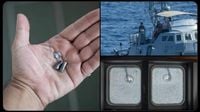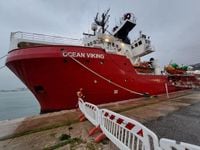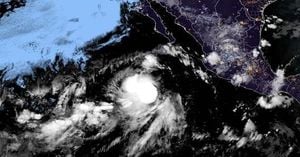It was a harrowing Sunday afternoon on August 24, 2025, as the usually perilous waters of the central Mediterranean became the scene of a violent confrontation that has sent shockwaves through the humanitarian and maritime communities. According to reports from SOS Mediterranee, a search and rescue non-profit, their Norwegian-flagged vessel, the Ocean Viking, came under sustained gunfire from Libya’s coast guard while searching for a migrant boat in distress. The attack, lasting at least 20 minutes, occurred in international waters approximately 40 nautical miles north of the Libyan coast—a region notorious for high-stakes rescues and fraught international relations.
The Ocean Viking, chartered in partnership with the International Federation of Red Cross and Red Crescent Societies (IFRC), was carrying 87 survivors at the time, including nine unaccompanied minors, all recently rescued from other boats during the perilous crossing from North Africa to Europe. The vessel had been cleared by Italian authorities to temporarily pause its journey to Italy’s assigned disembarkation port in order to search for another boat in distress, according to SOS Mediterranee and corroborated by Euractiv. The humanitarian crew found themselves suddenly and violently targeted by a Corrubia-class patrol vessel operated by the Libyan coast guard—a ship itself donated to Libya by Italy in 2023 as part of the European Union’s Support to Integrated Border and Migration Management in Libya (SIBMMIL) programme, as highlighted by Times of Malta and Euractiv.
"They started shooting several rounds, not just one or two warning shots," a source familiar with the incident told Euractiv. "I've seen them shoot before, a couple of bullets as a warning sign, but this time it was sustained gunfire." The gunfire, described as "relentless" and "heavy," lasted for at least 20 minutes, with bullet fragments and damage to the vessel documented in photographs posted by SOS Mediterranee on their website and social media accounts. The organization stated, "Although no one was physically wounded, everyone on board feared for their lives, and crucial rescue equipment and the ship herself suffered significant damage."
According to SOS Mediterranee, the Libyan patrol vessel approached the Ocean Viking and unlawfully demanded that it leave the area and head north. The rescue crew complied and informed the Libyan authorities they were departing, but, as the organization recounted, "without any warning or ultimatum, two men aboard the patrol vessel opened fire... unleashing at least 20 relentless minutes of assault gunfire directly at us." Survivors and crew were left shaken but unharmed, a fact that many have called miraculous given the scale and duration of the attack. The damage to the ship, however, was significant, with some sources warning that the vessel may even be declared unseaworthy due to the extent of the destruction.
In the aftermath of the gunfire, the Ocean Viking issued a mayday call and was referred to the closest NATO vessel, an Italian navy ship. Yet, as SOS Mediterranee reported, "the Italian Navy never answered the phone." The Ocean Viking ultimately continued its journey north, heading toward Siracusa, Italy, to disembark the 87 survivors and undertake critical repairs—a journey that underscored both the resilience of the humanitarian crew and the fragility of the rescue infrastructure in the Mediterranean.
The incident has drawn immediate and forceful condemnation from SOS Mediterranee, whose director of operations, Soazic Dupuy, declared, "We demand a full investigation into the events of yesterday afternoon and that those responsible for these life–threatening attacks be brought to justice." Dupuy went further, calling for "an immediate end to all European collaboration with Libya," arguing that Libya’s actions demonstrate it "cannot be considered a competent authority." The organization’s statement characterized the attack as "outrageous and unacceptable," asserting, "The methods, circumstances, and dynamics clearly demonstrate a deliberate, targeted attack on our crew and, secondly, on our rescue capabilities."
This is not the first time the Ocean Viking has been targeted by Libyan authorities. In 2022, the organization reported that a Libyan patrol boat had fired multiple shots at the ship’s speedboats during another rescue operation in international waters. SOS Mediterranee and other humanitarian groups have long accused the Libyan coast guard of "reckless behaviour that endangers people at sea, flagrantly violates human rights and shows total disregard for international maritime law." Yet, as the organization points out, "European states, with Italy at the forefront, continue to support, equip, and train the Libyan Coast Guard." The Corrubia-class patrol vessel involved in Sunday’s attack is just one example of the material support provided under agreements such as the 2022 memorandum renewed by Italy, which includes funding, vessels, and training.
The broader context is stark: the central Mediterranean is one of the deadliest migration routes in the world, with thousands of people attempting the crossing each year in search of safety or opportunity in Europe. Humanitarian organizations like SOS Mediterranee have played a crucial role in rescuing migrants from unseaworthy boats, often in the face of hostile or indifferent authorities. The increasing criminalization of rescue operations and the growing hostility from state actors—now manifesting in open gunfire—pose grave risks not only to migrants but also to the crews dedicated to saving lives at sea.
International maritime law is clear: ships in international waters have the right to navigate freely, and the use of force against humanitarian vessels is strictly prohibited. The attack on the Ocean Viking raises urgent questions about accountability and the future of search and rescue missions in the Mediterranean. As SOS Mediterranee put it, "We cannot accept an internationally recognised coast guard carrying out unlawful assaults. Furthermore, we call for an end to the criminalisation of rescue, which only creates fertile ground for these incredibly vicious attacks."
Calls for accountability have grown louder, with demands for a thorough investigation and an end to European collaboration with Libyan authorities. Meanwhile, the 87 survivors aboard the Ocean Viking—including vulnerable minors—face an uncertain future, while the ship’s crew must contend with the trauma of the attack and the daunting task of repairing their vessel. The incident stands as a stark reminder of the perilous intersection of humanitarian work, migration policy, and international politics in the Mediterranean—a place where the lines between rescue and danger have never been more blurred.
As the Ocean Viking limps toward port, battered but unbowed, the world is left to grapple with the implications of an attack that could have ended in tragedy—and may yet reshape the future of humanitarian rescue at sea.






